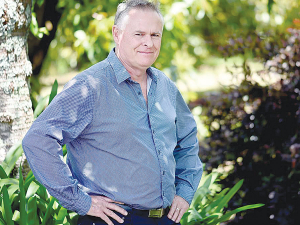Out with Fonterra, in with Mainland Dairy
Changed logos on shirts otherwise it will be business as usual when Fonterra’s consumer and related businesses are expected to change hands next month.
 Fonterra chairman Peter McBride says the co-op's future success relies on its ability to maintain a sustainable milk supply in an increasingly competitive environment.
Fonterra chairman Peter McBride says the co-op's future success relies on its ability to maintain a sustainable milk supply in an increasingly competitive environment.
Fonterra could lose up to one-fifth of its milk supply unless it adopts a new capital structure.
The warning was delivered by chairman Peter McBride last week as he unveiled a revised capital structure proposal to farmer shareholders.
The revised proposal has key changes including a minimum shareholding requirement for farmer suppliers, allowing sharemilkers, contract milkers and farm lessors to buy co-operative shares and easier exit and entry provisions for supplier.
McBride and the board will take the new proposal back to shareholders in the coming weeks for further consultations.
He's confident of farmer support.
McBride says changing the co-operative's capital structure is a critical decision and not something the board and senior management are taking lightly.
"We are confident that thhis proposal would support the sustainable supply of New Zealand milk that our long-term strategy relies on."
McBride notes that Fonterra's future success relies on its ability to maintain a sustainable milk supply in an increasingly competitive environment.
"We see total New Zealand milk supply as likely to decline, and flat at best. Our share of that decline depends on the actions we take with our capital structure, perfomance, productivity and sustainability.
"If we do nothing, we are likely to see around 12-20% decline by 2030 based on the scenarios we have modelled."
Key changes are:
Unhappy Investors
Investors holding units in Fonterra Shareholders Fund are unhappy with the co-op's proposal to cap the listed fund.
In a letter to unit holders, the fund's chairman John Sherwin says retaining the fund, but removing features that support growth, liquidity, and relevance to investment markets, could put downward pressure on unit pricing.
The price of the units has declined about 25% since early March, when Fonterra published results of a shareholder survey that showed high support for farmer control and little interest in raising external capital.
Expect greater collaboration between Massey University’s school of Agriculture and Environment and Ireland’s leading agriculture university, the University College of Dublin (UCD), in the future.
A partnership between Torere Macadamias Ltd and the Riddet Institute aims to unlock value from macadamia nuts while growing the next generation of Māori agribusiness researchers.
A new partnership between Dairy Women’s Network (DWN) and NZAgbiz aims to make evidence-based calf rearing practices accessible to all farm teams.
Despite some trying circumstances recently, the cherry season looks set to emerge on top of things.
Changed logos on shirts otherwise it will be business as usual when Fonterra’s consumer and related businesses are expected to change hands next month.
Reflecting on the past year, Horticulture New Zealand chief executive Kate Scott says there has been a lot to celebrate.
OPINION: Fonterra may be on the verge of selling its consumer business in New Zealand, but the co-operative is not…
OPINION: What does the birth rate in China have to do with stock trading? Just ask a2 Milk Company.